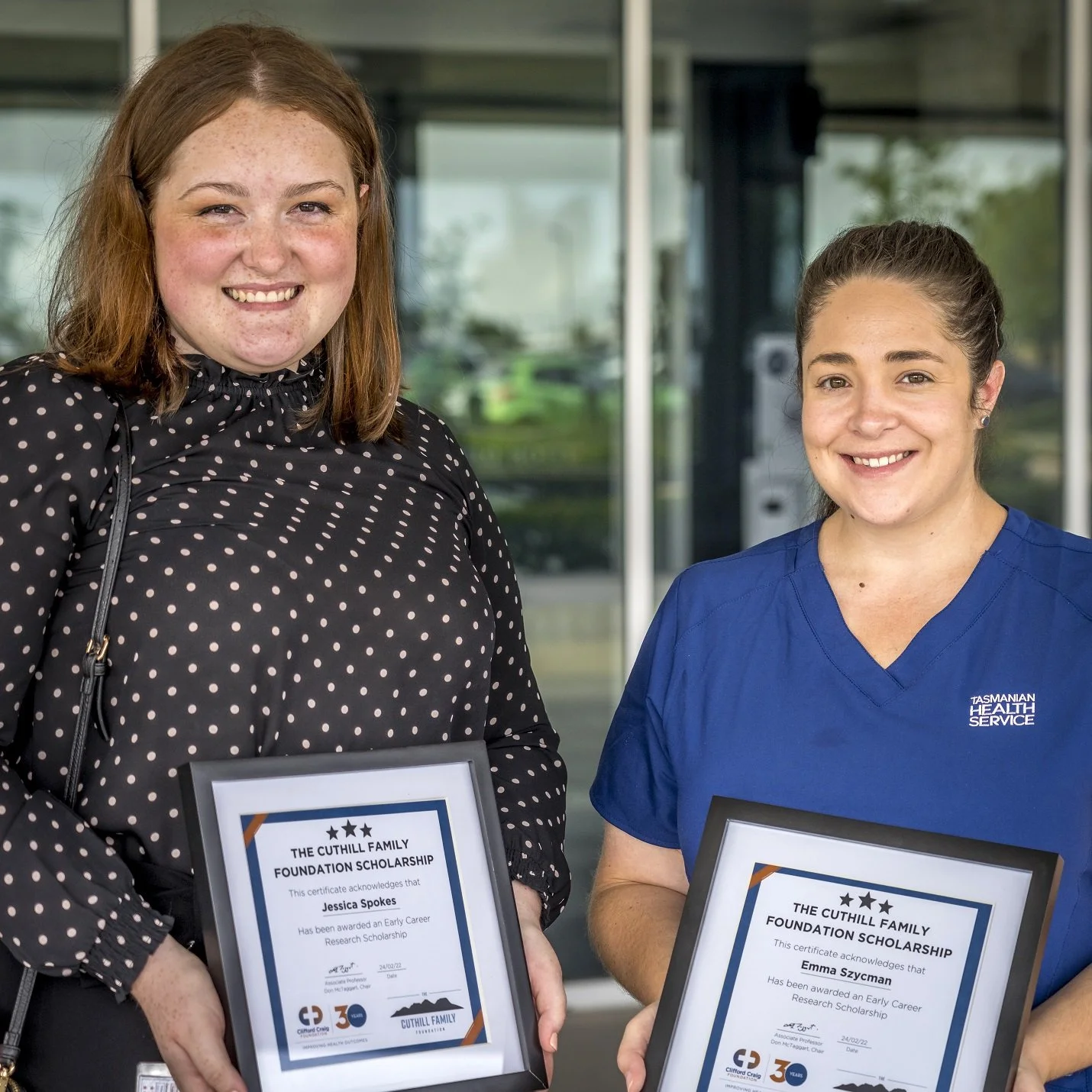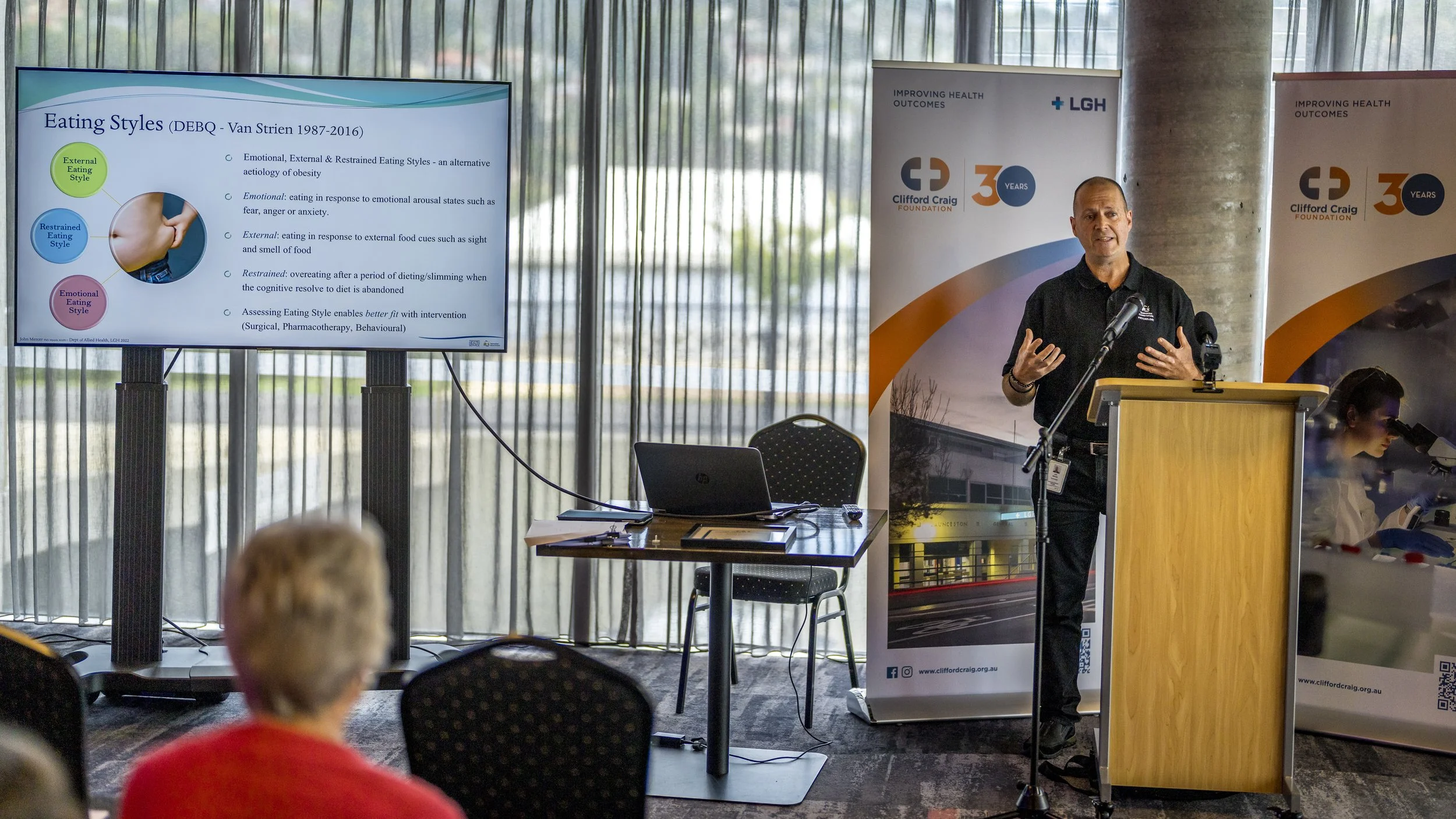2022 Medical Research Grants Announced
February, 2022
A world-first trial examining the immune response to COVID-19 vaccines in pregnant women and the effects of Ketamine on post-traumatic stress disorder are among the latest innovative medical research projects to gain funding from the Clifford Craig Foundation.
Chairman Associate Professor Don McTaggart has announced $540,914 for 4 new projects as part of the Foundation’s 2022 medical research grants.
This is in addition to previously announced funding of $204,257 for 6 projects which will continue in 2022, along with $183,565 in extra funding for 2 projects currently being undertaken at the LGH.
In an exciting extension of the Foundation’s commitment to research education at the Launceston General Hospital, the inaugural recipients of two Early Career Research Scholarships worth $12,500 each will also be announced.
Made possible by the philanthropic support of the Cuthill Family Foundation, the scholarships are aimed at supporting up and coming clinicians with translational research and have this year been awarded to LGH Nurse Emma Szycman and intern pharmacist Jessica Spokes.
Ms Szycman’s study will examine the variables and clinical variations associated with inadequate bowel preparations, while Ms Spokes’ research is aimed at reducing antipsychotic use in dementia through pharmacist-led intervention.
Early Career Research Scholarship recipients Jessica Spokes and Emma Szycman.
Both scholarships resulted from the Clifford Craig Foundation’s Medical Research Training Course, which commenced at the LGH in April last year.
In what represents the most significant annual funding commitment in its 30-year history, Associate Professor McTaggart said the combination of the newly announced grants, scholarships together with the existing research program will see the Clifford Craig Foundation allocate in excess of $807,842 for medical research in Tasmania’s North and North-West in 2022.
“These projects will further enhance the Clifford Craig Foundation’s vision for the Launceston General Hospital to be recognised nationally as a centre of research excellence,” he said.
“Further, through these scholarships we are now helping the next generation of Tasmanian researchers get their start.
“Our community should be extremely proud that because of its ongoing support, the Foundation is able to assist with the delivery of world-class research projects such as this.”
The newly announced research grants are:
COVID-19 vaccination of vulnerable populations – Professor Katie Flanagan – $360,000
A world-first trial examining the immune response to COVID-19 vaccines in vulnerable populations, COVULPOP will quantify and compare vaccine-induced humoral and cellular immune responses to COVID-19 vaccination between pregnant women and the elderly.
While existing COVID-19 vaccines have been approved based on data indicating they are safe, elicit an immune response and protect against COVID-19, to date there is no robust safety and immunogenicity data for pregnant women and the elderly.
This will be the first study to use Systems Vaccinology to study COVID-19 vaccine responses in pregnant women and the elderly, and the first to investigate the link between vaccine responses diet, microbiota inflammation, immunity and mood disorders.
In what marks the most significant individual medical research funding commitment in its 30-year history, the Clifford Craig Foundation will provide $360,000 over 2 years for Professor Flanagan to carry out the study in Tasmania, in partnership with the University of Tasmania’s School of Health Sciences, the Royal Melbourne Institute of Technology, Monash University and the Peter Doherty Institute.
Professor Flanagan is the Head of Infectious Diseases at the Launceston General Hospital and is also a member of the Australian Technical Advisory Group on Immunisation.
Effects of ketamine on pain outcomes, depression, anxiety and post-traumatic stress: pain treatment experience and patient perceptions – Associate Professor Luke Johnson – $80,000
Almost 1 in 5 Australians aged 45 and over are living with chronic pain. The conditions are common and serious and around half of patients also experience depression or anxiety.
Ketamine is a drug that affects brain signalling. It has been safely used as an aesthetic agent and for treatment of pain for about the last 50 years.
At low doses ketamine can have temporary effects on how memories are perceived and re-remembered and it has the potential to be used in conjunction with psychiatry talk therapies to help treat and prevent future psychological distress in patients with pain.
This project will establish important initial clinical data at the LGH and Tasmania’s North-West to establish if ketamine affects the psychological outcomes of pain, and also what people know and think about being treated with ketamine.
The first use of an anaesthetic drug in Australia (ether) in the 1880s was performed in Launceston. This project will continue the history of medical advances with anaesthetic drugs in Launceston by investigating further uses of an established drug ketamine for potential uses to help treat mental health conditions related to pain.
Associate Professor Johnson is an Academic Lead at the University of Tasmania’s School of Psychological Sciences.
Evaluating the role of endothelial to mesenchymal transition in the pathogenesis of idiopathic pulmonary fibrosis & pulmonary hypertension – Dr Sukhwinder Sohal – $80,000
IPF is a relatively common and devastating lung disease most commonly found in those aged over 50. There is no cure, with an average survival rate of just three years.
IPF patients are increasingly prone to abnormal structural changes in the pulmonary arteries, leading to the development of pulmonary hypertension (PH).
The goal of this research project is to better understand the early pathology of IPF and its driving mechanisms. Understanding this will enable to health professionals to diagnose IPF earlier, and more accurately, leading to significant therapeutic implications.
Specifically, this study aims to determine how the process of the endothelial-to-mesenchymal transition (EndMT) contributes to pulmonary hypertension and fibrogenesis in IPF.
Recent research led by Dr Sohal and also funded by the Clifford Craig Foundation, indicates EndMT is one of the fundamental pathological mechanisms that leads to increase in myofibroblasts and fibrotic destruction of the lung tissue.
This project will also compare the findings to other chronic respiratory diseases such as chronic obstructive pulmonary disease (COPD) to understand differences in pathology of different disease of same organ. Lesson learned in IPF will also be applicable to other disease models.
Dr Sohal is a senior lecturer at the University of Tasmania and is currently leading the Respiratory Translational Research Group at the University of Tasmania’s School of Health Sciences in Launceston.
Pancreatitis in Tasmania: Quantifying the epidemiological and economic burden of disease – Professor Richard Turner – $24,974
This project marks the first study in Australia, and possibly the world, to explore the epidemiology and health economic implications of pancreatitis at a state or regional level.
Addressing an area of high need in Tasmania’s North and North-West, it will explore quality improvement for patient care and health service delivery, partnerships between academics and health service providers and an innovative approach for measuring disease burden.
The pancreas is a gland organ that produces insulin and other important enzymes and hormones that help break down foods.
Acute pancreatitis (AP), recurrent AP, and chronic pancreatitis (CP) represent a spectrum of disease involving the exocrine pancreas whereby inappropriate intra-parenchymal activation of digestive enzymes may lead to a systemic inflammatory response, local tissue injury and, over time, progressive, irreversible fibrosis. Consequences range from chronic pain, malabsorption, diabetes and death.
This project will enable state-wide hospital and pathology data to be linked to provide a researchable dataset of Tasmanian pancreatitis cases from 2007-2018.
A comprehensive picture will be obtained for disease burden pertaining to epidemiology, resource utilisation, established guideline compliance, and the determinants of these.
The results will inform future quality improvement strategies. At a national level, this study will inform similar studies to be undertaken in other Australian states which, by five years, will result in a ‘national’ picture of the disease burden of pancreatitis and lead to optimal disease management policies across the country.
Professor Turner is a Professor of Surgery with the University of Tasmania’s School of Medicine.
The Early Career Research Scholarship Recipients are:
Improving patient outcomes in disease of the gut-bowel preparation - Emma Szycman - $12,500
While colonoscopy remains the preferred ‘gold standard’ screening strategy for bowel cancer, poor preparation of the bowel prior to a screening often means the bowel is not clear enough for a doctor to carry out a thorough inspection.
At the LGH about 50 colonoscopies are performed each week.
However, it is estimated that adequate bowel preparation is only seen in between 60-70% of cases.
Considered annually, this means up to 780 colonoscopies need to be repeated each year – an annual cost of at least $878,000.
This research project will examine the variables and clinical variations associated with inadequate bowel preparations.
It is hoped that by better understanding why patients are having inadequate bowel preparations, health professionals can address the problems identified to deliver more efficient, safer and a higher standard of gastroenterology healthcare to patients.
This includes improved patient outcomes, satisfaction and reduced costs.
Reducing antipsychotic use in dementia through pharmacist-led intervention – Jessica Spokes – $12,500
Dementia is estimated to effect up to 436,000 Australians and is the leading cause of death nationwide. Behavioural and psychological symptoms of dementia (BPDS) are often triggered during hospital admission. Many symptoms of BPSD such as wandering and calling out are unlikely to response to antipsychotic medications. The only means by which an antipsychotic may have efficacy in this case is by sedating the patient, which constitutes inappropriate restraint. Risperidone is the only antipsychotic indicated for use in dementia in Australia, however studies have shown only an 8% decrease in behaviour severity.
Only one trial has investigated the possibility of reducing antipsychotic use in Australian hospitals, however this did not assess the frequency of behaviours, cost-effectiveness, or reductions in lengths of stay. This study aims to investigate these gaps in the literature to assess the feasibility of a Geriatric Antipsychotic Stewardship (GApS) Pharmacist to encourage de-escalation of antipsychotic medications in patients with dementia. It will be the first in Australia to examine the 6-month feasibility of antipsychotic stewardship on improving patient outcomes and reducing adverse effects, length of stay and the associated costs.
In 2022 Clifford Craig has granted extra funding towards 2 projects which are currently being undertaken at the LGH:
Dr John Mercer.
Effect of photo biomodulation on Cardiac and Inflammatory Bio-markers after Percutaneous Coronary Intervention – Dr Rohit Barthwal and Dr Michael Fox – $149,600
Cardiovascular disease is still the single greatest cause of mortality in Australia. There are more than 50,000 heart attacks in Australia each year and over 40,000 Australians die from cardiovascular disease annually.
Currently, patients who present with heart attack or risk of heart attack would normally have a stent inserted into the arteries of the heart to fix the blockage. The sudden return of blood to an area of the heart that has not been receiving blood flow previously can cause damage itself. This damage can be measured by rises in a blood protein called troponin, a biomarker that indicates heart muscle damage.
This project is a simple novel approach to see if preconditioning the patient by use of laser therapy can reduce cardiac damage shown as a rise in troponin. The project will use low level laser applied through the skin to see if the damage to the heart can be reduced when a stent is inserted.
Improving Bariatric Surgery Outcomes – Dr John Mercer – $33,965
Obesity is a complex, multifaceted phenomenon which overlaps physiological, dietetic and psychological domains. Surgery to assist with weigh loss is increasingly performed in Australia, how not all have good outcomes.
This study aims to determine whether eating styles (emotional, external and restrained) are a factor which can be used to reliably predict post-surgical outcomes. If eating styles can predict weight loss and psycho=dietetic adjustment outcomes after Bariatric surgery, they could be factored into the pre-surgical assessment process.
This could identify people for whom Bariatric surgery may have been predictably poor post-surgical outcomes, thereby reducing the number and cost of unnecessary surgeries, surgery reversals, and/or other adverse reactions and dietic outcomes.









